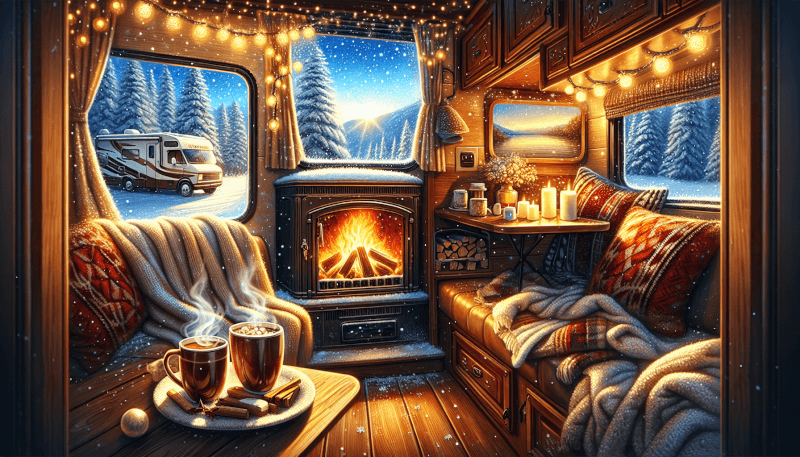Imagine hitting the road with your cozy RV, surrounded by the serene beauty of snow-covered landscapes. It’s the perfect recipe for a memorable winter adventure! But before you embark on this chilly escapade, it’s essential to prepare yourself for the unique challenges that come with RV camping in winter. From staying warm and conserving energy to navigating icy roads, this article will provide you with valuable tips and tricks to ensure your winter RV camping trip is as cozy and hassle-free as possible. Get ready to embrace the winter wonderland!
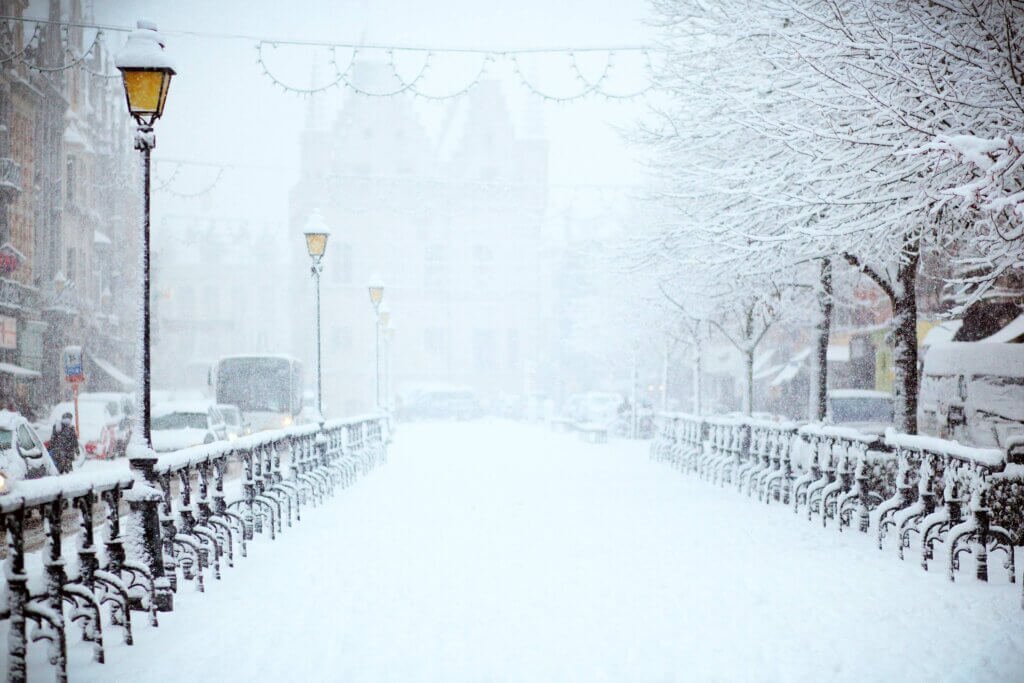
Preparing Your RV for Winter Camping
Insulating Your RV
When it comes to winter camping in your RV, proper insulation is key. Insulating your RV will help retain heat and keep you warm and comfortable inside. You can insulate your RV by adding extra insulation to the walls, roof, and floor. This can be done with insulation foam or reflective insulation. Pay special attention to areas where drafts may be present, such as windows and doors. Insulating these areas will further improve the insulation of your RV.
Winterizing Your RV’s Plumbing System
Before embarking on your winter camping trip, it’s essential to winterize your RV’s plumbing system to prevent freezing and damage. Start by draining all water from the water tanks, water lines, and water heater. You’ll also want to add antifreeze to the plumbing system to ensure any remaining water won’t freeze. Be sure to follow the manufacturer’s instructions when using antifreeze. By properly winterizing your RV’s plumbing system, you can avoid costly repairs and plumbing issues.
Checking Your RV’s Heating System
A functioning heating system is vital for your comfort during winter camping. Before hitting the road, it’s important to thoroughly inspect and test your RV’s heating system. Check your furnace to make sure it’s in good working condition and that there are no leaks. Additionally, check the vents and ducts to ensure proper airflow. If necessary, consider investing in a space heater as a backup heating source. By thoroughly checking your RV’s heating system, you can stay warm and cozy throughout your winter camping adventure.
Stocking Up on Supplies
When winter camping, it’s crucial to stock up on supplies to ensure a comfortable and enjoyable trip. Make a checklist of essential items you’ll need, such as extra blankets, warm clothing, and winter gear like gloves and hats. Don’t forget to pack enough food and water to last for the duration of your trip, as well as any medications or personal hygiene products you may need. It’s also a good idea to bring extra fuel, batteries, and a fully stocked first aid kit. By being prepared with the right supplies, you can have a worry-free winter camping experience.
Packing Warm Clothing and Bedding
In addition to stocking up on supplies, it’s important to pack warm clothing and bedding for your winter camping trip. Layering your clothing is key to staying warm in cold temperatures, so pack thermal underwear, sweaters, jackets, and waterproof outerwear. Don’t forget to pack warm socks, hats, and gloves to keep your extremities warm. When it comes to bedding, consider using flannel sheets, thermal blankets, and down comforters. Electric blankets and heated mattress pads can also be a great addition for extra warmth during the night. By packing the right clothing and bedding, you’ll be well-equipped to stay warm and comfortable in your RV during winter camping adventures.
Choosing the Right Campsite
Researching Campgrounds
When selecting a campsite for your winter camping trip, it’s important to do your research. Look for campgrounds that are open during the winter months and check their availability. Keep in mind that some campgrounds may have limited amenities during this time, so be sure to plan accordingly. Read reviews and ask for recommendations from fellow RV enthusiasts to find a campsite that suits your needs and preferences.
Considering Proximity to Amenities
While winter camping, it’s important to consider the proximity of your chosen campsite to amenities. Look for campgrounds that offer amenities such as electricity hookups, water hookups, and laundry facilities. These amenities can make your winter camping experience more comfortable and convenient. It’s also a good idea to choose a campsite that is relatively close to grocery stores, gas stations, and other necessities. This way, you’ll have easy access to supplies and services during your trip.
Checking for Accessibility in Winter
Before finalizing your campsite selection, make sure to check for accessibility during the winter months. Look for campgrounds that have properly cleared roads and paved driveways, as well as sites that have been cleared of snow and ice. It’s essential to ensure that you’ll be able to safely maneuver your RV into your chosen campsite. Additionally, check for any seasonal closures or restrictions that may impact your winter camping plans.
Ensuring Proper Drainage
When choosing a campsite for winter camping, it’s important to consider proper drainage. Look for a campsite that is situated on higher ground to avoid potential flooding or pooling of water caused by melting snow. Proper drainage is important to prevent water from seeping into your RV and causing damage. Additionally, be mindful of the natural flow of water in the campground to avoid setting up your campsite in an area prone to runoff.
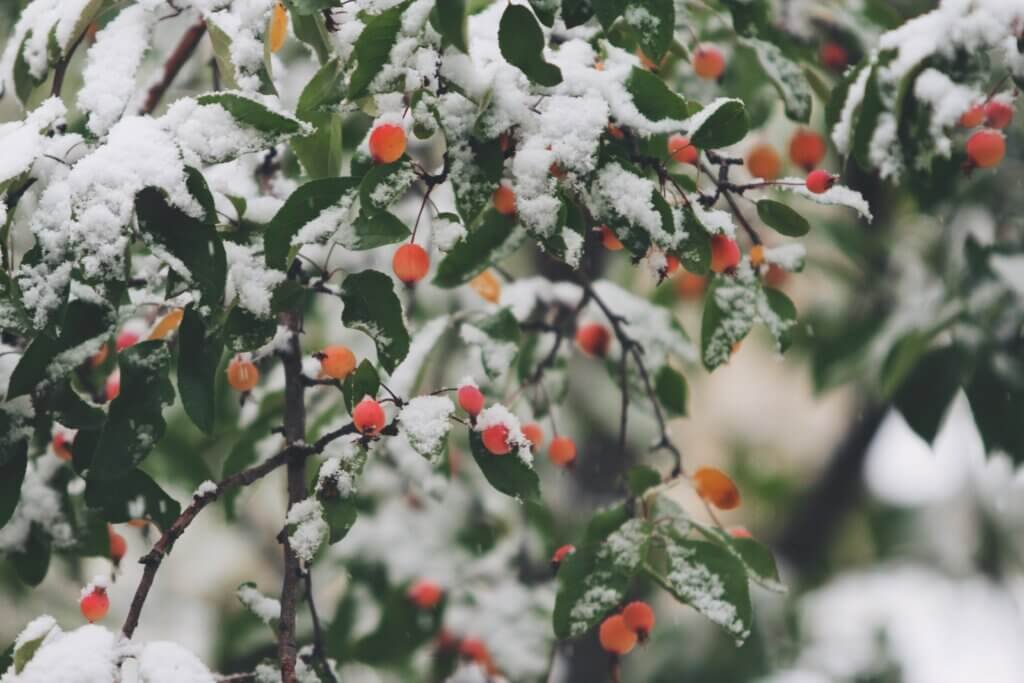
Setting Up Camp
Leveling Your RV
Properly leveling your RV is essential for a comfortable and safe camping experience. Utilize leveling blocks or jacks to ensure that your RV is stable and level. This will not only make your stay more comfortable but also prevent any appliances or systems, such as your refrigerator or plumbing, from malfunctioning. Take the time to measure the levelness of your RV and make adjustments as needed before settling in for your winter camping trip.
Positioning for Sunlight
During the winter months, sunlight can be a valuable source of natural warmth. When setting up camp, consider positioning your RV to maximize exposure to sunlight. This can help warm up your RV during the day and reduce the reliance on heating systems. Take note of the sun’s path throughout the day and adjust the position of your RV accordingly. Remember to also consider any nearby trees or structures that may block sunlight and choose a spot that offers optimal exposure.
Creating a Windbreak
Winter camping often means dealing with strong winds and cold drafts. To combat this, consider creating a windbreak around your RV. This can be done by setting up a windscreen or using natural barriers such as trees or large rocks. A windbreak will not only help to block cold winds from entering your RV but also provide an added layer of insulation. Be creative with your windbreak setup and adjust its placement as needed based on the direction and strength of the wind.
Using Skirting or Insulating Foam
To further protect your RV from the cold, consider using skirting or insulating foam. Skirting involves attaching panels around the bottom of your RV to create an insulated barrier. This helps to prevent cold air from seeping in and keeps the underside of your RV warmer. Insulating foam can be used to cover windows, vents, and other areas prone to drafts. It provides an additional layer of insulation and helps to seal any gaps. By using skirting and insulating foam, you’ll enhance the overall insulation of your RV and keep the interior warmer.
Preparing for Cold Weather
Monitoring Weather Conditions
As with any outdoor activity, it’s important to closely monitor weather conditions when winter camping. Pay attention to weather forecasts and be prepared for changes in temperature, wind, snowfall, and other conditions. Keep in mind that winter weather can be unpredictable, and it’s important to have a backup plan in case of severe weather. Stay informed and make adjustments to your camping plans if necessary to ensure a safe and enjoyable experience.
Using Space Heaters Safely
Space heaters can be a great addition to your RV during winter camping, as they provide targeted warmth in specific areas. However, it’s crucial to use them safely to prevent accidents and fires. Only use space heaters that are specifically designed for RV use and follow the manufacturer’s instructions. Keep heaters away from flammable materials, and never leave them unattended. It’s also important to ensure proper ventilation to prevent the buildup of carbon monoxide. By using space heaters safely, you can enjoy a cozy and warm RV without compromising safety.
Preventing Condensation and Moisture
Condensation and moisture can be common issues when winter camping in an RV. Excessive moisture can lead to mold, mildew, and damage to your RV’s interior. To prevent condensation, make sure your RV is properly ventilated by opening windows or using ceiling vents. Use moisture-absorbing products, such as dehumidifiers or moisture traps, to eliminate excess moisture. Additionally, avoid drying wet clothes inside the RV to minimize humidity levels. By taking proactive steps to prevent condensation and moisture, you’ll maintain a dry and comfortable living space.
Insulating Windows and Doors
Windows and doors are common areas where cold air can enter your RV and warm air can escape. Insulating these areas will help maintain a comfortable temperature inside your RV. Use weather stripping to seal gaps around windows and doors, preventing drafts. For added insulation, consider using window insulation film or thermal curtains. These products help to trap heat inside your RV and prevent cold air from seeping in. By properly insulating windows and doors, you’ll create a more comfortable and energy-efficient living environment.
Sealing Drafts and Leaks
Along with windows and doors, there may be other areas in your RV where drafts and leaks can occur. Take the time to inspect your RV for any gaps, cracks, or openings that may allow cold air to enter. Use caulk, foam sealant, or weatherstripping to seal these areas and prevent drafts. Pay attention to areas such as vents, electrical outlets, and seams in the walls and roof. By sealing drafts and leaks, you’ll further improve the insulation of your RV and maintain a cozy environment.

Managing Energy and Water Use
Conserving Battery Power
In winter camping, it’s important to conserve battery power to ensure you have enough electricity for essential appliances and systems. Use LED lights and energy-efficient appliances to minimize power consumption. Be mindful of leaving lights on when not needed and unplug any unused electronics. Consider investing in solar panels or a generator to provide additional power if needed. By conserving battery power, you’ll be able to use necessary amenities without worrying about draining your batteries.
Using Insulated Water Hose
To prevent freezing and damage to your water supply, use an insulated water hose for winter camping. Insulated water hoses are designed to withstand cold temperatures and prevent water from freezing inside. They are equipped with built-in insulation that keeps the water flowing, even in freezing conditions. When connecting your RV to a water source, ensure the insulated hose is properly connected and protected from extreme cold. By using an insulated water hose, you’ll have a reliable water supply throughout your winter camping trip.
Keeping Tanks from Freezing
Frozen tanks can be a major inconvenience during winter camping. To prevent this, insulate your RV’s freshwater and wastewater tanks. You can use tank heaters or heat pads specifically designed for RVs. These devices provide a gentle and consistent heat that prevents freezing. It’s important to follow the manufacturer’s instructions for installation and operation of tank heaters. By keeping your tanks from freezing, you’ll avoid the hassle of dealing with frozen or damaged plumbing systems.
Using Freshwater Tank Heaters
An alternative to insulating your freshwater tank is to use a freshwater tank heater. These heaters are specifically designed to keep the water in your tank from freezing. They function by heating the water inside the tank to a temperature that prevents freezing. When using a freshwater tank heater, it’s important to monitor the temperature and ensure it remains within a safe range. A properly functioning tank heater will provide you with a constant supply of freshwater, even during cold winter weather.
Managing Grey and Black Water Tanks
Properly managing your grey and black water tanks is essential during winter camping. These tanks can freeze if not properly maintained, leading to plumbing issues and potential damage to your RV. Regularly empty and flush your wastewater tanks to prevent buildup and freezing. Consider using environmentally-friendly antifreeze specifically designed for RV plumbing systems to prevent freezing and ensure proper drainage. It’s also important to use biodegradable tank treatments to break down waste and prevent odors. By effectively managing your grey and black water tanks, you’ll maintain a clean and functional plumbing system throughout your winter camping trip.
Cooking and Staying Warm
Choosing the Right Cooking Appliances
When it comes to cooking during winter camping, it’s important to choose the right appliances that provide reliable heat. Opt for appliances that are designed for RV use and have safety features specifically for indoor use. Propane stoves and electric cooktops are popular options for winter cooking in RVs. Additionally, consider using slow cookers or thermal cookers, as they provide a low and consistent heat that keeps food warm for extended periods. By choosing the right cooking appliances, you’ll be able to prepare delicious and hot meals even in cold weather.
Using Thermal Cookers or Crock-Pots
Thermal cookers and crock-pots are excellent options for winter camping as they require minimal energy and provide a convenient way to cook warm and hearty meals. These appliances work by using the retained heat from boiling food to continue the cooking process. Simply bring your meal to a boil on the stovetop, transfer it to the thermal cooker or crock-pot, and let it continue cooking without using any additional energy. This is especially useful for long days of outdoor activities when you want to come back to a warm meal waiting for you.
Enjoying Warm Drinks and Meals
One of the most enjoyable aspects of winter camping is indulging in warm drinks and meals. Pack a thermos or insulated bottles to keep hot beverages such as coffee, tea, or hot chocolate warm throughout the day. Prepare soups, stews, or chili that can be easily reheated on the stovetop or in the microwave. Consider investing in a portable electric kettle for quick and convenient hot water for drinks or instant meals. Enjoying warm and comforting food and drinks is a great way to stay cozy during your winter camping adventure.
Using Electric Blankets or Heated Mattress Pads
To stay warm and comfortable during the night, electric blankets or heated mattress pads can be a great addition to your RV bedding. These products provide gentle warmth and can be adjusted to your desired temperature. Electric blankets are particularly useful for warming up your bed before going to sleep, while heated mattress pads provide constant warmth throughout the night. Make sure to follow the manufacturer’s instructions and safety guidelines when using these products. By incorporating electric blankets or heated mattress pads into your bedding, you’ll have a cozy and restful sleep during your winter camping trip.
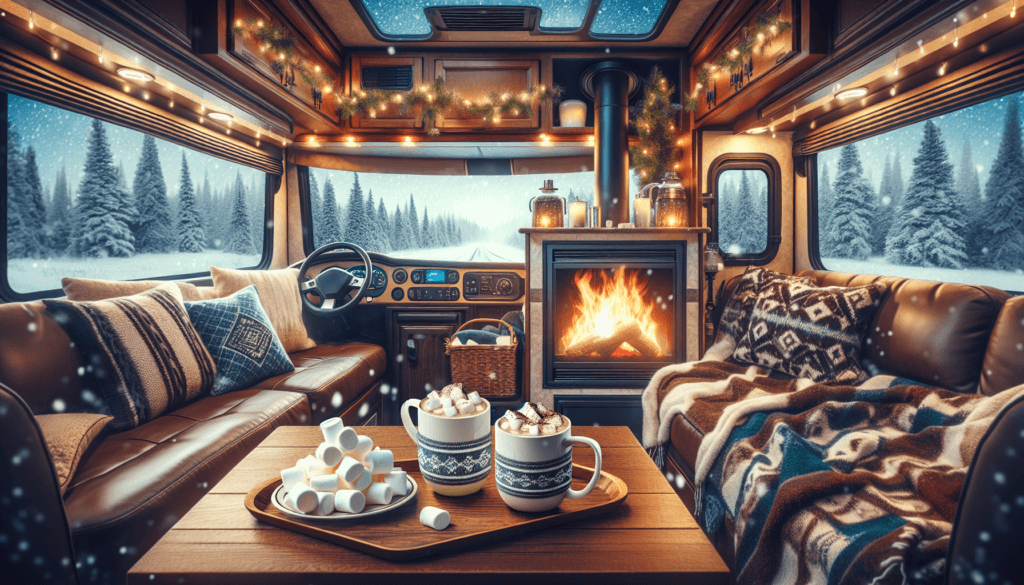
Safety Considerations
Checking Carbon Monoxide and Smoke Detectors
Safety should always be a top priority when winter camping in your RV. Before your trip, make sure to check the carbon monoxide and smoke detectors in your RV. Ensure that they are in working order and have fresh batteries. Carbon monoxide poisoning and fires can be life-threatening, so it’s important to have functioning detectors that can alert you to potential hazards. Test the detectors regularly during your trip to ensure they are functioning properly.
Keeping Fire Safety Precautions
When using heating appliances or cooking in your RV, it’s important to follow fire safety precautions. Keep flammable materials away from heat sources and always supervise any open flames. Use fire extinguishers that are suitable for RVs and have them readily accessible. Make sure to familiarize yourself with the location and proper use of fire extinguishers. Establish an evacuation plan and communicate it with everyone in your RV. By practicing fire safety precautions, you can minimize the risk of fire incidents and keep yourself and your fellow campers safe.
Avoiding Overloading Circuits
Winter camping often requires the use of multiple appliances and heating systems simultaneously. It’s important to avoid overloading your RV’s electrical circuits. Be mindful of the power requirements of each appliance and system and distribute the load evenly throughout your RV. Consider using a surge protector to protect your RV’s electrical system from power surges. Overloading circuits can lead to electrical malfunctions and potentially cause fires. By managing your electrical usage and avoiding overloading circuits, you’ll ensure a safe and reliable power supply in your RV.
Being Prepared for Emergencies
When winter camping, it’s crucial to be prepared for emergencies. Have a well-stocked first aid kit readily available and ensure that everyone in your RV knows its location. Familiarize yourself with basic first aid procedures and be prepared to handle common injuries or illnesses. Additionally, have emergency contact numbers for local authorities and medical facilities easily accessible. Keep a backup power source, such as a generator or extra batteries, in case of power outages. By being prepared for emergencies, you’ll have peace of mind and be equipped to handle unexpected situations during your winter camping trip.
Entertainment and Activities
Bringing Books, Games, and DVDs
While winter camping, it’s important to have options for entertainment indoors. Bring a selection of books, games, and DVDs to keep yourself and your fellow campers entertained during downtime. Choose books or e-readers that suit your interests, and pack a variety of board games or card games that can be enjoyed by all ages. DVDs or streaming services can provide hours of entertainment on cold evenings. By having a range of indoor entertainment options, you can stay occupied and have fun even when the weather is less than ideal.
Trying Indoor Campfire Alternatives
If you’re missing the coziness of a campfire, consider trying indoor campfire alternatives. A popular option is a portable electric fireplace or an electric campfire simulation. These devices provide the visual effects of flames and the warmth associated with a real fire, without the need for open flames. They are safe to use indoors and can create a cozy ambiance. Alternatively, you can create a faux campfire by placing battery-operated LED tea lights inside a fireproof container filled with rocks or sand. This will give you a similar visual effect and add a touch of warmth to your RV.
Exploring Winter Sports and Activities
While winter camping, take advantage of the activities and sports that the season offers. If your campsite is located near a ski resort, hit the slopes and enjoy skiing or snowboarding. Go snowshoeing or cross-country skiing in nearby trails. If conditions allow, try ice fishing on a frozen lake or go ice skating. Winter camping provides opportunities to explore and experience nature in a unique way. Research the local attractions and winter activities in your chosen camping area and plan your outdoor adventures accordingly.
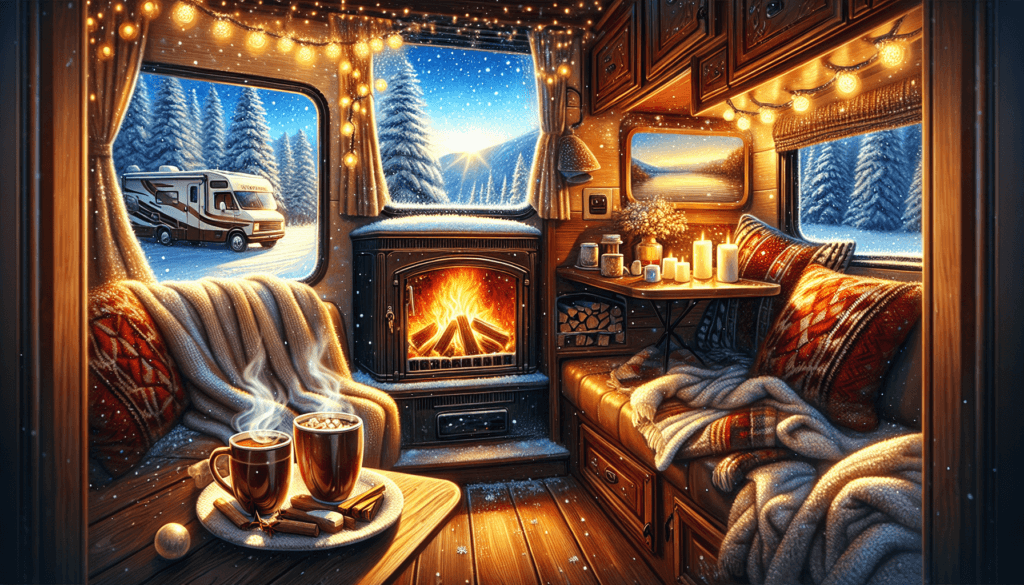
Connecting with Others
Joining RV Camping Clubs or Groups
Winter camping can be an opportunity to connect with other RV enthusiasts. Consider joining RV camping clubs or groups that organize winter camping trips. These clubs provide a sense of community and the opportunity to share experiences and tips with fellow campers. Participating in club activities or group events can enhance your winter camping experience and create lasting friendships. Look for clubs or groups in your area or online that cater to winter camping and join in on the fun.
Attending Winter RV Rallies and Events
Another way to connect with others who share your passion for RV camping is to attend winter RV rallies and events. These gatherings bring together RV enthusiasts from different backgrounds and provide opportunities to socialize and learn from each other. Winter RV rallies often feature workshops, seminars, and activities tailored specifically for winter camping. Attending these events can be both educational and enjoyable, allowing you to expand your RV camping knowledge while making new friends along the way.
Interacting with Fellow Campers
While camping in winter, make an effort to interact with fellow campers in your chosen campground. Strike up conversations, share tips, and exchange stories. You may discover valuable insights and recommendations from experienced winter campers. Collaborate on group activities or invite others to join in on your own adventures. Building connections with fellow campers adds to the overall enjoyment of your camping experience and enhances the sense of community.
Tips for Safe Driving in Winter
Checking Tire Conditions
Before hitting the road for your winter camping trip, thoroughly check the condition of your RV’s tires. Ensure that they have adequate tread depth and are properly inflated. Cold weather can cause tire pressure to drop, so regularly check and adjust the tire pressure as needed during your trip. Consider using winter or all-weather tires that provide better traction and grip on snowy or icy roads. By maintaining proper tire conditions, you’ll enhance the safety and performance of your RV while driving in winter conditions.
Understanding Winter Driving Techniques
Winter driving requires a different set of skills and techniques compared to driving in fair weather conditions. Equip yourself with the knowledge and understanding of winter driving techniques before embarking on your winter camping trip. Learn how to control your vehicle on slippery surfaces, such as icy or snowy roads. Practice braking and steering techniques specific to winter driving. Keep a safe distance from other vehicles and adjust your speed according to road conditions. Being aware of and using proper winter driving techniques will help ensure a safe and smooth journey to your destination.
Carrying Emergency Supplies
When driving in winter conditions, it’s important to carry emergency supplies in case of unexpected events or accidents. Pack a winter survival kit that includes items such as a flashlight, extra batteries, a first aid kit, a blanket, extra clothing, non-perishable food, water, and a portable charger for your cellphone. Additionally, carry tire chains or traction mats in case you encounter snowy or icy roads. It’s also a good idea to have a shovel, an ice scraper, and a bag of sand or cat litter to improve traction if you get stuck. By being prepared with emergency supplies, you’ll be ready to handle any challenging situations that may arise during your winter drive.
Monitoring Road Conditions
When planning your winter camping trip, it’s essential to monitor road conditions along your route. Stay updated on weather forecasts and road conditions by checking local transportation websites or using mobile apps. Keep in mind that winter weather can cause road closures, delays, or hazardous driving conditions. Adjust your plans accordingly and be prepared to make alternate arrangements if necessary. Prioritize your safety and the safety of your passengers by staying informed and making informed decisions based on the current road conditions.
In conclusion, winter camping in your RV can be an incredibly rewarding and cozy experience with the right preparation and precautions. By insulating your RV, winterizing the plumbing system, checking the heating system, and stocking up on supplies, you’ll ensure a comfortable stay during the cold winter months. Choosing the right campsite, setting up camp strategically, and preparing for cold weather are essential for a successful winter camping trip. Managing energy and water use, cooking and staying warm, and prioritizing safety considerations will enhance your overall experience. Entertainment, connecting with others, and driving safely are additional aspects to consider for a memorable and enjoyable winter camping adventure. With these comprehensive tips, you’ll be well-equipped to make the most of your winter camping experience in your RV. Stay warm, stay safe, and enjoy the wonders of winter camping!

